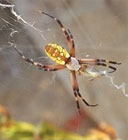

West
African Folk-Tales
by William H. Barker and Cecilia Sinclair
How
We Got the Name "Spider Tales"
How
Wisdom Became the Property of the Human Race
Why
the Lizard Moves His Head Up and Down
Why
White Ants Always Harm Man's Property
Why We See Ants Carrying Bundles As Big As Themselves
Why Spiders Are Always Found in Corners of Ceilings
Anansi
and the Blind Fisherman
The
Grinding-Stone That Ground Flour By Itself
Why the Sea-turtle When Caught Beats Its Breast With Its Forelegs
How
Beasts and Serpents Came into the World
Why the Moon and the Stars Receive Their Light From the Sun
How
the Tortoise Got Its Shell
Why the Leopard Can Only Catch Prey On Its Left Side
King
Chameleon and the Animals
To Lose an Elephant For the Sake of a Wren Is a Very Foolish Thing To Do
Why Tigers Never Attack Men Unless They Are Provoked
Why the Moon and the Stars Receive Their Light From the Sun
ONCE upon a time there was great scarcity of food in the land. Father Anansi and his son, Kweku Tsin, being very hungry, set out one morning to hunt in the forest. In a short time Kweku Tsin was fortunate enough to kill a fine deer—which he carried to his father at their resting-place. Anansi was very glad to see such a supply of food, and requested his son to remain there on guard, while he went for a large basket in which to carry it home. An hour or so passed without his return, and Kweku Tsin became anxious. Fearing lest his father had lost his way, he called out loudly, "Father, father!" to guide him to the spot. To his joy he heard a voice reply, "Yes, my son," and immediately he shouted again, thinking it was Anansi. Instead of the latter, however, a terrible dragon appeared. This monster breathed fire from his great nostrils, and was altogether a dreadful sight to behold. Kweku Tsin was terrified at his approach and speedily hid himself in a cave near by.
The dragon arrived at the resting-place, and was much annoyed to find only the deer's body. He vented his anger in blows upon the latter and went away. Soon after, Father Anansi made his appearance. He was greatly interested in his son's tale, and wished to see the dragon for himself. He soon had his desire, for the monster, smelling human flesh, hastily returned to the spot and seized them both. They were carried off by him to his castle, where they found many other unfortunate creatures also awaiting their fate. All were left in charge of the dragon's servant—a fine, white cock—which always crowed to summon his master, if anything unusual happened in the latter's absence. The dragon then went off in search of more prey.
Kweku Tsin now summoned all his fellow-prisoners together, to arrange a way of escape. All feared to run away—because of the wonderful powers of the monster. His eyesight was so keen that he could detect a fly moving miles away. Not only that, but he could move over the ground so swiftly that none could outdistance him. Kweku Tsin, however, being exceedingly clever, soon thought of a plan.
Knowing that the white cock would not crow as long as he has grains of rice to pick up, Kweku scattered on the ground the contents of forty bags of grain which were stored in the great hall. While the cock was thus busily engaged, Kweku Tsin ordered the spinners to spin fine hempen ropes, to make a strong rope ladder. One end of this he intended to throw up to heaven, trusting that the gods would catch it and hold it fast, while he and his fellow-prisoners mounted.
While the ladder was being made, the men killed and ate all the cattle they needed—reserving all the bones for Kweku Tsin at his express desire. When all was ready the young man gathered the bones into a great sack. He also procured the dragon's fiddle and placed it by his side.
Everything was now ready. Kweku Tsin threw one end of the ladder up to the sky. It was caught and held. The dragon's victims began to mount, one after the other, Kweku remaining at the bottom.
By this time, however, the monster's powerful eyesight showed him that something unusual was happening at his abode. He hastened his return. On seeing his approach, Kweku Tsin also mounted the ladder—with the bag of bones on his back, and the fiddle under his arm. The dragon began to climb after him. Each time the monster came too near the young man threw him a bone, with which, being very hungry, he was obliged to descend to the ground to eat.
Kweku Tsin repeated this performance till all the bones were gone, by which time the people were safely up in the heavens. Then he mounted himself, as rapidly as possible, stopping every now and then to play a tune on the wonderful fiddle. Each time he did this, the dragon had to return to earth, to dance—as he could not resist the magic music. When Kweku was quite close to the top, the dragon had very nearly reached him again. The brave youth bent down and cut the ladder away below his own feet. The dragon was dashed to the ground but Kweku was pulled up into safety by the gods.
The latter were so pleased with his wisdom and bravery in giving freedom to his fellowmen, that they made him the sun the source of all light and heat to the world. His father, Anansi, became the moon, and his friends the stars. Thereafter, it was Kweku Tsin's privilege to supply all these with light, each being dull and powerless without him.
The text came from:
Barker,
William H.
and Cecilia Sinclair. West African Folk-tales. Lagos, Africa: Bookshop, 1917.
Amazon.com:
Buy the book in paperback.
©Heidi
Anne Heiner, SurLaLune Fairy Tales
E-mail: surlalune@aol.com
Page last updated September 5, 2006
www.surlalunefairytales.com









